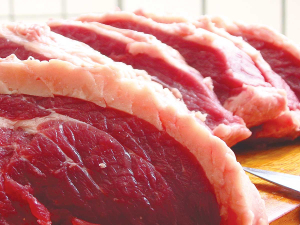New Order
OPINION: If old Winston Peters thinks building trade relations with new nations, such as India, isn't a necessary investment in our future, he has rocks in his head.
 The latest report from the Meat Industry Association (MIA) shows that for the 12 months to June, overall exports were down by 7% to $9.9 billion.
The latest report from the Meat Industry Association (MIA) shows that for the 12 months to June, overall exports were down by 7% to $9.9 billion.
The downturn in China continues to impact New Zealand’s red meat exports.
The latest report from the Meat Industry Association (MIA) shows that for the 12 months to June, overall exports were down by 7% to $9.9 billion. China remained the largest market for the year, but exports were down 32% to $2.86b. It accounted for 29% of all exports compared to 39% last year.
But while the Chinese market remains somewhat depressed, the news from other markets, in particular the US, is good. In the past year, exports to the US increased by 16% to $2.66b, offsetting the soft Chinese market. The next three largest markets were Japan, up 13% to $490 million, the UK, up 45% to $456m, and Canada, up 58% to $370m.
Overall sheepmeat volumes in the past year increased by 3% to 389,509 tonnes, but the weak China market saw value fall 9% to $3.59b. At the same time, volumes to China were down 14% and the value was down 33% to $1.05b.
MIA chief executive Sirma Karapeeva said that while the China market remains soft, with some recovery expected in 2025, other key markets were seeing positive returns.
“Exports to North America and the UK increased by volume and value with volumes to the EU largely unchanged but value fell by 10%,” she says.
In terms of beef, volumes also increased by 3% to 511,736 tonnes but value fell by 4% to $4.42b, largely due to China. But Karapeeva says this was partly offset by growth into the US, up 30% to $1.74b, Canada up 106% to $209m, and Japan up 27% to $328m.
“The value of beef exports to the US was also significantly higher than to China and while NZ exported only 9000 tonnes more beef to the US compared to China during the year, the exports to the US were worth $470m more,” she says.
Karapeeva says after a full year of the free trade agreement (FTA) operating, the UK was one of the top 10 beef markets for 2023/24, the ninth largest by volume at 3881 tonnes and eighth largest by value at $48m.
While the China scenario continues to influence the returns to our farmers, there are some signs in the latest data from June 2024 that other markets are picking up. For example, the US, says Karapeeva, was the most valuable sheepmeat market for the month – the first time this has happened since 2017.
The US imported NZ sheepmeat worth $62m, with China dropping by 39% to $52m. At the same time, while beef exports to China were down 44% to $83m, exports to the US rose 16% to $221m, 101% to Japan to $46m and 112% to Canada to $35m.
Dairy Women's Network (DWN) has announced that Taranaki dairy farmer Nicola Bryant will join its Trust Board as an Associate Trustee.
Rural Women New Zealand (RWNZ) says it welcomes the release of a new report into pay equity.
Red meat exports to key quota markets enjoyed $1.4 billion in tariff savings in the 2024-25 financial year.
Remediation NZ (RNZ) has been fined more than $71,000 for discharging offensive odours described by neighbours as smelling like ‘faecal and pig effluent’ from its compositing site near Uruti in North Taranaki.
Two kiwifruit orchards in the Bay of Plenty and one in Northland are this year's finalists for the Ahuwhenua Trophy competition.
The Government's chief science advisor, Dr John Roche says the key objective for the science sector in the coming year is bedding down the reforms which sees the merger of the previous entities.

OPINION: A mate of yours truly reckons rural Manawatu families are the latest to suffer under what he calls the…
OPINION: If old Winston Peters thinks building trade relations with new nations, such as India, isn't a necessary investment in…